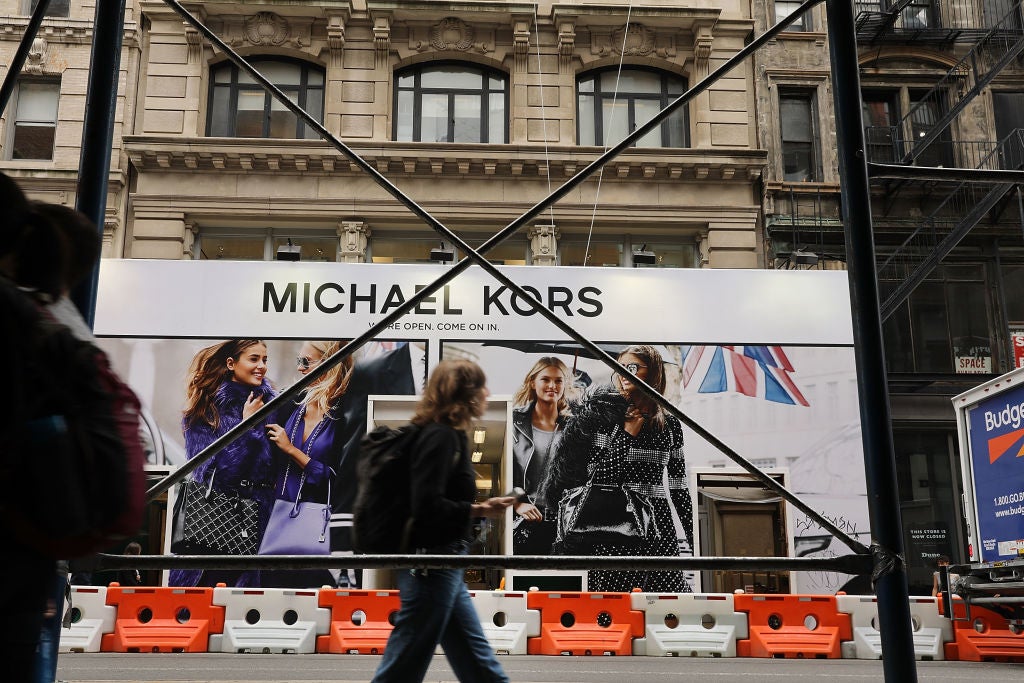
Tapestry, the parent company of luxury fashion brands Coach, Kate Spade and Stuart Weitzman, has announced it will acquire Capri Holdings which has a portfolio of luxury fashion brands including Jimmy Choo, Michael Kors for $8.5bn with the deal expected to complete in 2024.
Inside the Tapestry-Capri Holdings deal
Tapestry CEO Joanne Crevoiserat says the company’s “data-driven customer engagement platform” has been key to its success in recent years and this will be expanded into the three brands joining its roster.
The global luxury market for handbags, accessories, footwear and apparel is worth a total of $200bn, according to GlobalData’s Global Luxury Apparel market 2020-2025 report, and is surprisingly resilient to pressure from inflation and the cost-of-living, as luxury consumers tend to be less impacted by spending restraints.
GlobalData also points out the luxury market is expected to grow at a CAGR of 10% until 2025 as a result of this trend with luxury apparel outperforming total apparel each year until 2025, largely driven by growth in the APAC region.
For this reason it is expected that Tapestry’s purchase of Capri Holdings will help them tap into a wider cross-section of this strong market.
Crevoiserat explains: “The combination of Coach, Kate Spade and Stuart Weitzman together with Versace, Jimmy Choo and Michael Kors creates a new powerful global luxury house, unlocking a unique opportunity to drive enhanced value for our consumers, employees, communities and shareholders around the world.”

US Tariffs are shifting - will you react or anticipate?
Don’t let policy changes catch you off guard. Stay proactive with real-time data and expert analysis.
By GlobalDataBoth Tapestry and Capri’s brands have also previously been linked with Joshua Schulman, former president and CEO of Tapestry’s Coach brand taking the role of CEO at Michael Kors in 2021. Schulman then became CEO at Capri Holdings in 2022.
Here’s why the deal matters
GlobalData apparel analyst Louise Deglise-Favre suggests Tapestry could be attempting to create a US-based rival to the European fashion giants LVMH and Kering, which both continue to dominate the luxury fashion market worldwide.
Once the deal is finalised, Tapestry says the six brands combined will generate more than $12bn in annual revenue. But, even after the deal completes next year, Tapestry will still have a much smaller market share than LVMH’s 14 brands with €79.2bn ($86.58bn) annual revenue reported for 2022 .
Tapestry’s brands are also more focused on the “affordable luxury” market than its rivals, Deglise-Favre points out. Consequently shoppers in this market are more vulnerable to the increasing cost of living, making the category more at risk as rising costs continue to impact consumers’ shopping habits.
Deglise-Favre adds: “The acquisition will set Tapestry as a major American fashion conglomerate, allowing it to better compete with European rivals such as LVMH and Kering, and will strengthen its position within the ‘affordable luxury’ market.”
Key takeaways for the fashion industry
While Versace and Jimmy Choo have performed well in recent years, with both reporting record revenue at the end of the most recent financial year, Michael Kors has struggled. The brand only saw single digit revenue growth in 2023, according to Capri Holdings’ year-end report. In the first quarter of 2024, its total revenue decreased by 13.8% compared to the same period in 2023. In the same quarter, its operating income was $130m and operating margin was 16.5% – compared to $222m and 24.3% in the first quarter of 2023.
Deglise-Favre is cautious about the deal and states: “The deal comes with a lot of risk, given the hefty price tag and Michael Kors’ fragile position following years of lacklustre performance. Tapestry will have to repeat the tour-de-force it performed at Coach and Kate Spade to turn Michael Kors’ failing brand image around and re-establish it as a desirable label, all while keeping the momentum going at Versace and Jimmy Choo.”
Speaking on a call with investors after the deal was announced, Tapestry’s chief financial officer and chief operating officer Scott Roe predicted that Michael Kors would see “low single-digit revenue growth” on the horizon, “with a modest decline in the near term” after Tapestry’s purchase.
When asked about Michael Kors recent performance on the call, Crevoiserat added that all three of Capri’s brands were “strong” and “well-positioned in attractive markets and market segments” despite this. She also noted that Tapestry sees an opportunity in direct-to-consumer for the brand, while concerns had been raised about its performance in wholesale. She added: “Michael Kors is a strong brand and it’s well positioned, in the market, with strong consumer resonance and awareness across customer demographics.”
Tapestry’s direct-to-consumer model has been a significant part of its recent success and looks to be a key part of its plans with the three new additions going forward. It says that is will use its “proven and profitable” model here to increase these sales with the new brands.
Deglise-Favre highlights that Tapestry will need to prioritise revenue from outside of the US in order to succeed in the competitive luxury market.
“The Americas region dragged Capri’s performance down in its most recent results, declining 16.3% as high inflation continues to wreck havoc on shoppers’ budgets,” she explains.
More research:
Apparel Industry Mergers and Acquisitions Deals by Top Themes in Q1 2023 – Thematic Intelligence
Global Luxury Apparel Market & Forecasts to 2025
Each week, Just Style’s editors select a deal that illustrates the themes driving change in our sector. The deal may not always be the largest in value, or the highest profile. But we select it because of what it tells us about where the leading companies are focusing their efforts, and why. We pick apart the deal itself, and the industry theme behind it. This new, thematic deal coverage is driven by our underlying Disruptor data which tracks all major deals, patents, company filings, hiring patterns and social media buzz across our sectors.



